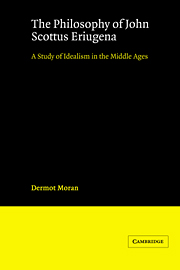Book contents
- Frontmatter
- Contents
- Preface
- Acknowledgments
- Chronology
- List of abbreviations
- 1 European intellectual culture in the ninth century
- 2 The predestination debate
- 3 Eriugena's life and early writings
- 4 The Greek awakening
- 5 The Periphyseon
- 6 Eriugena as philosopher
- 7 Eriugena's sources
- 8 Dialectic, philosophy, and the life of the mind
- 9 The meaning of human nature
- 10 Self-knowledge and self-definition: the nature of human knowing
- 11 The meaning of non-being
- 12 The meaning of nature
- 13 Eriugena's influence on later mediaeval philosophy
- 14 Conclusion
- Bibliography
- Index nominum
- Index rerum
11 - The meaning of non-being
Published online by Cambridge University Press: 05 June 2012
- Frontmatter
- Contents
- Preface
- Acknowledgments
- Chronology
- List of abbreviations
- 1 European intellectual culture in the ninth century
- 2 The predestination debate
- 3 Eriugena's life and early writings
- 4 The Greek awakening
- 5 The Periphyseon
- 6 Eriugena as philosopher
- 7 Eriugena's sources
- 8 Dialectic, philosophy, and the life of the mind
- 9 The meaning of human nature
- 10 Self-knowledge and self-definition: the nature of human knowing
- 11 The meaning of non-being
- 12 The meaning of nature
- 13 Eriugena's influence on later mediaeval philosophy
- 14 Conclusion
- Bibliography
- Index nominum
- Index rerum
Summary
In this chapter we shall examine Eriugena's complicated doctrine of the meaning of non-being (non esse) or nothingness (nihil) in order to prepare the way for an understanding of the meaning of nature. Eriugena extends the concept of non-being to include God, man, and cosmos in their pure (or “uncreated”) state, and views this nonbeing as the infinite nothingness, which is more primordial than the procession of creatures into their causes and effects. Eriugena's philosophy is not being-centred, but has a complicated theory of the relativity of all being and non-being, and of an Ultimate which lies beyond both being and non-being. Eriugena makes the being of creatures subordinate to their being known or intelligised in the theoriae of infinite subjectivity. But he goes further in arguing that infinite subjectivity is itself to be understood as non-being. The four forms of nature can only be understood when their relationship to this non-being is explained.
The Latin background to the concept of non-being
Eriugena first discussed non-being in De praedestinatione (395a ff), where he argued that evil is to be understood as non-being and therefore it is neither created by God nor known to Him. He develops this argument further in the Periphyseon at II.596a–b, for example, where he argues that God's nature is simple and does not know evil; or at V.926a, where he says that God cannot be said to know the wickedness of angels or men. Of course, the Latin source of this assessment of evil is undoubtedly Augustinian.
- Type
- Chapter
- Information
- The Philosophy of John Scottus EriugenaA Study of Idealism in the Middle Ages, pp. 212 - 240Publisher: Cambridge University PressPrint publication year: 1989



